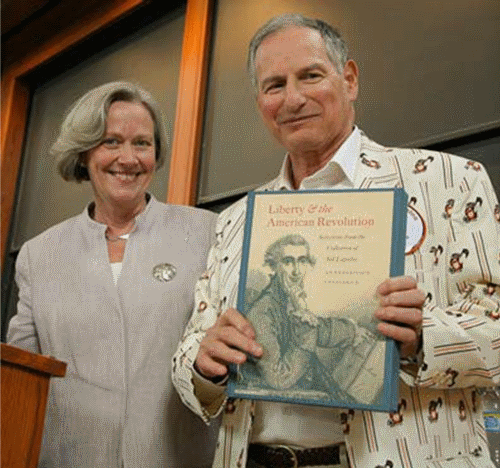The gravesites of Revolutionary War veterans in the Sears Cemetery in Brewster. The gravesite of…
Princeton library brings Revolutionary-era texts alive online

This engraving of author Thomas Paine is one of 150 items from the American Revolutionary era featured in the Princeton University Digital Library’s Sid Lapidus ’59 Collection on Liberty and the American Revolution. The digital collection is available online for free.
Emily Aronson
Office of Development Communications
Princeton University
July 2, 2012
More than 235 years after Thomas Paine challenged the American colonists to free themselves from British rule in his treatise “Common Sense,” history buffs around the world can study Paine’s rousing words and other Revolutionary-era texts through the Princeton University Digital Library.
Nearly 150 books, pamphlets and prints from the Sid Lapidus ’59 Collection on Liberty and the American Revolution were recently digitized in their original form and are available online for free. Readers may virtually flip through the frayed-edge pages of “Common Sense,” which helped inspire the Declaration of Independence after it was published in 1776, or enlarge detailed text and images featured in the works of Founding Fathers John Hancock, Alexander Hamilton, Thomas Jefferson, James Madison and many others.
The Lapidus Collection’s themes include the intellectual origins of the American Revolution; the Revolution itself; the early years of the republic; the resulting spread of democratic ideas in the Atlantic world; and the effort to abolish slavery in both Great Britain and the United States.

President Shirley M. Tilghman and Sid Lapidus, Class of 1959
Avid book collector Lapidus, a Princeton Class of 1959 alumnus and a history major as an undergraduate, gave the rarities to the University on the occasion of his 50th Reunion in 2009. The Princeton University Library hosted a major exhibition and published a 200-page catalog to mark that event. Earlier this year, the Internet alumnus, display the catalog for the 2009 Princeton University Library exhibit “Liberty and the American Revolution.” (Photo by Denise Applewhite)
“I want this material to be available to scholars of all levels, to open the minds of young people and those who are more experienced,” Lapidus said.
Stephen Ferguson, assistant University librarian for Rare Books and Special Collections and curator of rare books, said it took a team of eight people nearly a year to scan the approximately 32,000 pages for the digital library. Ferguson said the library plans to add more content to the website over time.
Please see Princeton Unversity’s website to read the complete article.
